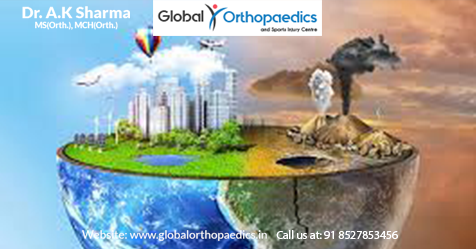Pollution causes 16% of deaths around the world…
That’s three times more deaths than AIDS, tuberculosis and malaria combined…
15 times more deaths than all wars and other forms of violence…
And more deaths than smoking, hunger and natural disasters.
How is it killing us? For starters, with disease…

You may have read that you can have a pollution triggered heart attack … or that you are likely breathing Alzheimer’s causing pollutants right now. Well, now you can add kidney disease to the list… Fine particulate matter, the kind that can trigger a heart attack, has been found to contribute to 10.7 million cases of chronic kidney disease per year! As we devote countless amounts of time, talent and money to solving the scourges of cancer and other diseases, doesn’t it make sense to give as much if not more attention to a highly preventable problem that is the cause behind so many of the very diseases we’re trying to cure?
In the meantime, we need ways to protect ourselves and our loved ones from the deadly consequences of pollution in all forms. Toward that end, here are some of the ways you can reduce your exposure…
Air pollution
- Check your area’s Air Quality Index (AQI)on the website of the Environmental Protection Agency, before venturing outside. No longer is air quality a concern just for people with asthma or other cardiac or pulmonary conditions.
- Exercise early: ozone levels are generally lower in the morning. If you exercise outdoors, do it in the morning or avoid exercise when the pollution is too high.
- Avoid heavy traffic whenever possible. Car emissions are the main source of air pollution. If you are sitting in traffic, close the windows and set the fan on ‘re-circulate’ to avoid drawing polluted air into your car. And if walking on a hilly street, choose the downhill side, where cars are not straining and spewing as many fumes.
- Replace harsh cleaning chemicals with natural alternatives. Many cleansers emit deadly chemicals into your home’s air.
- Make sure your gas stove is well ventilated to the outside. You’ll avoid exposure to nitrogen dioxide, carbon monoxide and formaldehyde.
- Use an indoor HEPA air filter. HEPA stands for high-efficiency particulate arresting. They are the only ones that efficiently gather pollutants, rather than spreading them. Also use a HEPA vacuum cleaner, and get your heating, ventilation and air conditioning checked regularly.
Water pollution
- Use cold water for drinking and cooking. Cold water is less likely to have lead in it, since lead from old pipes dissolves in warm water.
- Never re-boil water. Boiling is a great way to decontaminate, but re-boiling concentrates any potentially harmful chemicals in the water.
- Don’t use harsh chemicals in your yard that can leach into your drinking water.
- Detox regularly. Because we are exposed to so many pollutants, it’s a good idea to frequently detox your body. A good way to cleanse yourself of toxins is to submerge yourself in a warm-to-hot Epsom salt bath, and soak for at least half an hour. To do so, add ½ cup of baking soda under running water. When the tub is almost as full as you’d like it, add about 2 cups of Epsom salts.


